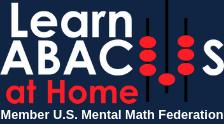
Research shows that Math Success at an early age is a clear indicator of future success not only in School but also beyond.
Does that surprise you? Probably not.
You have probably seen examples of this all around you.
But what does “early age” really mean? How early should parents introduce their child to Math?
We will answer these questions and more in this article.
And since we are all about Abacus Mind Math, besides the questions above, we will also discuss the appropriate age to introduce your child to Abacus Mind Math to really accelerate their learning.
How Early can you begin Math with your Child?
There are generally conflicting emotions around this topic.
Parents sometimes feel that they don’t want to put undue pressure on their child. After all, what’s the rush?
At other times parents wonder if their child may get left behind if they don’t start early enough especially when they see their neighbors and friends starting their children off early.
The question may seem difficult to answer, but the answer according to experts is quite simple – start early by introducing age appropriate activities as early as possible.
It’s amazing but children as young as 12 months old can start recognizing numbers. Everyday life activities and events begins introducing the concept of numbers. In fact, most times you don’t have to even do anything special to start them on their journey with numbers. Spoken language like first and second, big and small, open and close, two socks, five fingers, three cookies, four cheerios etc. can get the ball rolling.
Although they may be able to start recognizing numbers much earlier, you can start the process of reciting numbers with them through number books, sing along songs, and number games by the time they are 2 years old. Again, as long as you make it fun there are just so many things you can do with them to strengthen number recognition and recitation.
As you introduce numbers, also engage your child to apply their learning to real life so they can start comprehending numbers. Have them read the numbers on your mailbox, on street signs, in menus, on TV. Just anywhere you see numbers and it’s an opportune time to engage your child – basically gamify this experience as much as possible. This will give them an outlet to apply what they’ve been learning through songs and games and give you the satisfaction that your child is actually learning numbers and not simply reciting songs through rote memorization.
Although children develop differently, typically, between ages 3-4, you can safely introduce writing numbers to your child. Maybe just 0 to 9 to begin with and then moving on to two-digit numbers all the way to 99 over time.
Now you can always do more with your child like adding and subtracting, but in preparation for school, your child will be doing really well if they are reading and writing numbers 0 to 99 by the time they are 5.
And remember, like anything else with young children, “patience”, “fun” and “encouragement” are the keys to a relaxed and stress-free experience for both you and your child.
How Early can you begin Abacus Mind Math with your Child?
Mental Math aka Mind Math (the ability to calculate quickly in the head) is the ultimate in Math Fluency.
Getting from fluency in counting to the ability to calculate big string of number mentally at an early age may seem like a daunting undertaking, but it doesn’t have to be with Abacus Mind Math.
Typically, the next logical step after the child learns how to count fluently from 0 to 99 is to introduce addition and subtraction.
For most children, addition generally first begins with either simply counting up either on fingers or otherwise. Subtraction on the other hand is generally introduced as counting down. Using flashcards and physical objects to count up or down is also a good strategy.
Number lines are another good way to visualize addition and subtraction but these are generally introduced in school as an alternate way to learn addition & subtraction.
Over time through practice and repetition, a child will eventually learn to add and subtract without the help of any external aid. This is generally an ongoing and iterative process as the child goes through school and advances to higher grades.
Through rigorous practice and based on their mental capacity, a child can eventually learns how to do some of the simple addition and subtraction questions mentally.
But Abacus Mind Math will shorten the path to Mind Math and Amazing Math Fluency in a relaxed and stress-free manner with a much greater probability of success than otherwise possible.
Basic math operations the child would typically learn in Elementary School from kindergarten to fifth grade can be learned and mastered in just a few months with Abacus Mind Math.
When discussing the ability to calculate mentally with great speed and accuracy, it may sound counter intuitive, but the younger the child, the greater their ability to master this skill through Abacus Mind Math. “Why Abacus in this age of computers?” covers some of the science behind this.
As a rule of thumb, being able to read and write numbers 0 – 99 should be considered the minimum requirement to starting a child on Abacus Mind Math. Working backwards, this would imply that the earliest the child should start Abacus Mind Math should be around 4-5 years of age.
However, that doesn’t mean that children who have already learned basic math facts the traditional way will not benefit from Abacus Mind Math. In fact, success with Abacus Mind Math has more to do with the age of the child rather than what they have learned prior to starting Abacus Mind Math. Due to the elasticity and plasticity of the brain at an early age, Abacus Mind Math should be something that parents should consider for that child when they are under 12 years of age. Wide ranging benefits like improved focus, concentration, improved retention and, yes, amazing mind math abilities will serve them well, not only in school but also beyond.
CONCLUSION
A child’s brain is extremely malleable at an early age as a result of which they learn more quickly during these early years than at any other time in their life. With that recognition, there is no reason to fear introducing your child to numbers very early in their young life, which incidentally, you may already be doing without even trying. But remember as you get a little more formal with their learning, engage with them to explore numbers in a fun way. Adding a proven program like Abacus Mind Math to their math learning can really propel them towards Math Fluency and Math Success much faster than traditional learning methods so that they can tackle the challenges of advanced math later in life with greater confidence.
